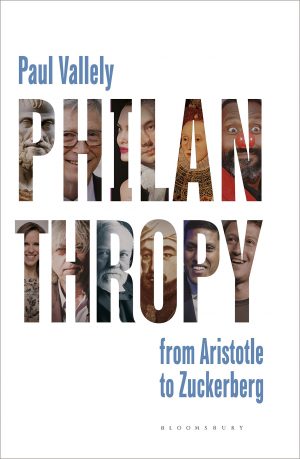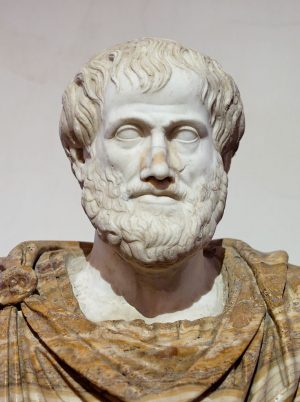 Review by Calum Carmichael.
Review by Calum Carmichael.
Challenges face anyone setting out to write a comprehensive account of philanthropy. First, philanthropy is a so-called ‘contested concept’: its meaning isn’t stable across time, location or individual. Second, it’s not a traditional area of inquiry: there’s no standard reference or foundational literature. Third and relatedly, those who study or write about it typically do so as experts of not philanthropy itself, but rather using an entry point based on an era, methodological approach, jurisdiction, cultural context or policy issue. Establishing common ground needs to be part of the process.

Challenges underlie some of the book’s limitations: its undeveloped normative guideposts; its selective focus; and its need for a coordinative framework.
Given these challenges, Paul Vallely is to be commended for his book Philanthropy: From Aristotle to Zuckerberg, published in 2020 – its goal of comprehensiveness reflected by its clever title and 756-page length. The first eleven chapters proceed chronologically from antiquity to the 21st century. The next seven address contemporary topics such as philanthropy’s role in international development, its celebrity endorsement, its political deployment and its effects on democracy. The final chapter is prescriptive, presenting a need and way to redeem philanthropy in its current state.
In some ways, the challenges noted above – the diverse meanings, open-ended field and specialist approaches – are allies of the book. They allow Vallely to cast a wide net, touching on a wide assortment of topics ranging from faith perspectives to political finance, utopian experiments to marketing techniques. This range ensures that every reader will be challenged by, intrigued with or informed about something in the book: responses evident in the laudatory dust-jacket comments from experts, all of whom the author cites and commends.
But in other ways, the same challenges underlie some of the book’s limitations: its undeveloped normative guideposts; its selective focus; and its need for a coordinative framework.
Normative guideposts
At the outset, Vallely refers to several definitions of philanthropy (e.g., ‘private initiatives for the public good’) but settles on none, explaining that all “are impoverished and in need of enrichment.” Yet starting with a definition, particularly of a contested concept, is important not simply to clarify the boundaries of one’s inquiry, but to determine and develop the normative criteria one will use to evaluate the phenomenon at hand (e.g., what constitutes ‘the public good’?) and to demonstrate the sources and remedies of its alleged ‘impoverishment’ – Vallely’s chosen assignment.
Standard ethical theory would group such criteria according to the consequences of philanthropy (consequentialism), the duties or obligations of practicing it (deontology), or the personal qualities and intentions of the philanthropist (virtue ethics). Sure enough, aspects of these considerations surface throughout the book. But only near the end does Vallely explicitly, albeit briefly, refer to consequentialism, and then implicitly refer to contending deontological factors.

Vallely wonders if philanthropy can “recover its lost soul,” and thereby return to the qualities it possessed in pre-Reformation Christendom, where rich and poor were “encompassed in a community of love.” Photo of St. Bartholomew’s Hospital in pre-Reformation England courtesy of the Wellcome Library (London) and Creative Commons.
Rather than frame and apply such well-known criteria, Vallely introduces various dualisms (e.g., ‘altruism’ vs ‘egoism’; ‘love of humanity’ vs ‘love of honor’; ‘empathy’ vs ‘effectiveness’; focus on ‘people’ vs focus on ‘product’; ‘heart’ vs ‘head’). Of these, he attributes the second half to philanthropy in its current state, and calls for more of the first half – to the end that philanthropy can “recover its lost soul,” become not simply strategic in pursuing results but reciprocal in strengthening the social relationships between givers and receivers, and thereby return to the qualities it possessed in pre-Reformation Christendom where rich and poor were “encompassed in a community of love.”
There are problems with building an argument by categorically attributing descriptors that are evocative but nevertheless imprecise and indemonstrable. Vallely alludes to some of these (e.g., philanthropy is complex, and the dualisms can operate simultaneously and variously), but doesn’t acknowledge how such problems undermine his case.
Vallely focuses his criticism of philanthropy in its current state to what he sees as its naïve reliance both on data to measure outcomes, and on self-centred, top-down decision-making that ignores the grassroots knowledge of both grantees and the communities they serve. Others have leveled similar charges, some of whom Vallely cites. However, he overlooks that such criticisms now come from the ‘strategic’ camp he targets, and that the discussion there has moved to the benefits of sharing and shifting power between donors and donees (e.g., Kania, Kramer and Russell, 2014; Weathers, 2016; Brest and Harvey, 2018). Such collaboration is seen as intrinsically important, say in countering the effects of colonization or racialization. But it’s also seen as instrumentally important, say in managing complex projects that require ongoing consultation and course correction, or in increasing the likelihood that terminal projects could generate enduring change by enabling grantees and their communities to apply their own assets of skill, knowledge and networks.
Admittedly, the sharing of power is difficult, but it’s happening (Hodgson and Pond, 2018). The conversion of philanthropy that Vallely calls for – one that fosters stronger trusting relationships between givers and receivers – is operative in part because of the strategic pursuit of ‘effectiveness’ and ‘product’ that ironically he perceives as a stumbling block.

Vallely offers something for everyone, starting with Aristotle 2400 years ago. Photo courtesy of Wiki Commons.
Selective focus
Vallely initially intended to write about philanthropy in England, but then realized such “a narrow national focus made no sense.” He widened that focus to add, in effect, one other country: the United States (chapters 7 to 18 deal almost exclusively with those two jurisdictions). His study isn’t so much about philanthropy as it’s about philanthropists – specifically, the very rich or well-positioned ones. Moreover, in considering the links between philanthropy and religious practice, he only refers to the Abrahamic faiths (i.e., Judaism, Christianity and Islam) and humanism, ignoring altogether any Eastern traditions (e.g., Buddhism, Hinduism or Sikhism). Thus contrary to the book’s title, length and dust-jacket endorsements – it’s neither comprehensive nor definitive. But to be fair, and as noted above, writing such a book would be a tall order.
Coordinative framework

Vallely’s book features remarkable personalities: early activists and social entrepreneurs; reformers and robber barons; entertainers and political players; eccentrics and IT billionaires; and plenty more. Photo of Mark Zuckerberg courtesy WikiMedia.
As noted, Vallely offers something for everyone. To a large extent, he ensures this by featuring remarkable personalities, from Aristotle to Zuckerberg, with many in between: early activists and social entrepreneurs; reformers and robber barons; entertainers and political players; eccentrics and IT billionaires; and plenty more. Alongside such personalities, he raises or touches on many of the questions and concerns that have become prominent over the past decade. Is philanthropy plutocratic? Which purposes or activities should remain within the purview of governments? Should philanthropists be accountable?
Vallely’s narrative is engaging and multifaceted. It’s an entertaining read. But amid so many trees, one loses sight of the forest – or even the confidence that a forest exists. At the outset, he claims that philanthropy is impoverished and in need of recovering its lost soul. And he returns to this in the final chapter. But how or whether the intervening material supports that claim is left largely to the reader’s imagination. Is it because philanthropy is ultimately a personal and very human phenomenon, subject to the foibles of those with the inclination and means to perform it – such that the enrichment and redemption of philanthropy ultimately requires the redemption of the philanthropists themselves? In other words, is it a matter of virtue ethics as devised by Aristotle? If so, then perhaps the book should be re-framed and re-named: Philanthropic Advice: From Aristotle to Zuckerberg.
This review is an abbreviated version of a forthcoming review in Nonprofit and Voluntary Sector Quarterly. Calum Carmichael is an Associate Professor in Carleton’s MPNL program and an editor of PANL Perspectives.



